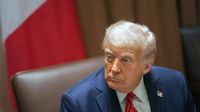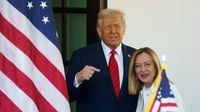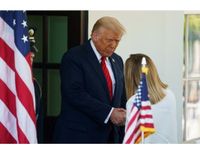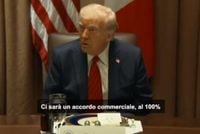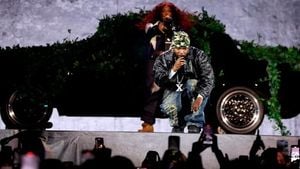In a bold assertion at the White House, President Donald Trump expressed unwavering confidence in reaching a trade agreement with the European Union (EU), declaring he was "100% sure" that a deal on tariffs and trade would materialize. This statement came during a meeting with Italian Premier Giorgia Meloni on April 17, 2025, marking their third engagement in just a few months.
Before the bilateral talks commenced, Trump emphasized that there would be "no problems in making an agreement with the EU on tariffs, there will be no problems with anyone." His optimism extended beyond Europe, as he also indicated that the United States would secure a "good deal" with China regarding tariffs, reflecting his administration's aggressive trade policy.
Meloni, who has been noted for her close ideological alignment with Trump, reciprocated his enthusiasm by stating she was certain of reaching an agreement, albeit clarifying that she could not negotiate on behalf of the entire EU. This nuance highlights the complexities of international negotiations, especially when dealing with a bloc of nations.
Following the initial remarks, Meloni expressed her aspirations to invite Trump for an official visit to Italy, hoping to facilitate a broader dialogue with European leaders. Such a visit could potentially strengthen ties between the U.S. and Italy, while also addressing the ongoing trade tensions that have escalated since Trump's administration began imposing tariffs.
The backdrop to these discussions is a tense trade environment, exacerbated by Trump's recent imposition of tariffs on various imports. Effective from April 5, 2025, these tariffs include a baseline of 10% on all products entering the U.S. and soaring rates of up to 145% on Chinese goods. This aggressive tariff strategy has raised concerns among U.S. allies, particularly those heavily reliant on exports to the American market.
Italy, as the third-largest trading partner of the United States, sends over 10% of its exports across the Atlantic. Similarly, Germany and France also have significant export figures to the U.S., with both countries sending 10% and 7% of their exports, respectively. This interconnectedness underscores the stakes involved in the current negotiations, as any escalation in tariffs could have far-reaching implications for these economies.
During their meeting, Trump praised Meloni, referring to her as "one of the true leaders of the world." Such commendations reflect a shared ultra-conservative ideology that both leaders embrace, particularly on contentious issues like immigration and what they term "gender ideologies." Their rapport has led U.S. officials to consider Meloni as a potential intermediary in negotiations between Europe and the U.S.
However, Meloni's close ties with Trump have sparked apprehension among her European partners. French Industry Minister Marc Ferracci expressed concerns that Meloni might act unilaterally during her visit to Washington, potentially undermining collective EU positions. This tension illustrates the delicate balance Meloni must navigate as she seeks to foster a strong relationship with the U.S. while maintaining solidarity within the EU.
In the midst of these trade talks, the European Central Bank (ECB) recently announced a cut in key interest rates by 0.25 percentage points, a move aimed at bolstering the Eurozone economy amid uncertainty. ECB President Christine Lagarde remarked that the bank must remain agile and responsive to the unpredictable economic landscape, a sentiment that resonates with the challenges posed by ongoing trade disputes.
As the discussions unfolded, Trump also indicated that an agreement with Ukraine regarding minerals would be signed on April 24, 2025. This aspect of his foreign policy further emphasizes the interconnected nature of international trade and geopolitical relations, particularly as the U.S. seeks to strengthen its alliances in Eastern Europe.
Addressing a contentious point, Trump denied making derogatory comments about Europeans, specifically the accusation of labeling them as "parasites." He clarified that the term had been used by others in his circle, such as J.D. Vance and Pete Hegseth, and he merely agreed with their sentiments. This clarification reflects the ongoing scrutiny Trump faces regarding his statements and the potential impact they have on diplomatic relations.
Despite the challenges and complexities of international negotiations, both Trump and Meloni remain committed to advancing their shared agenda. The upcoming weeks will be crucial as they work to solidify their trade agreements and navigate the broader implications of their policies on global trade.
As the world watches, the outcome of these discussions could significantly influence not only U.S.-EU relations but also the broader landscape of international trade, potentially setting precedents for how countries negotiate tariffs and engage in economic partnerships moving forward.
